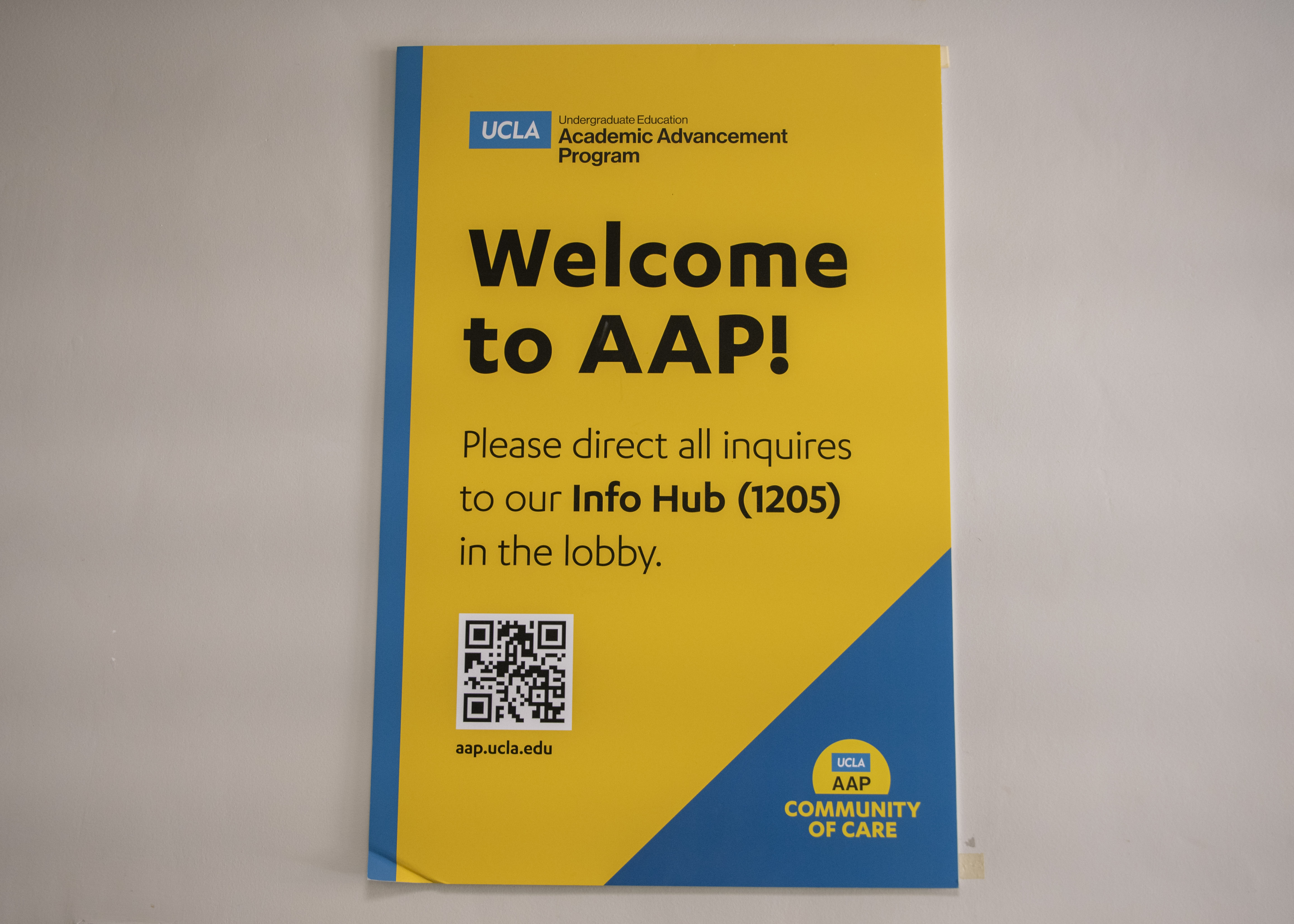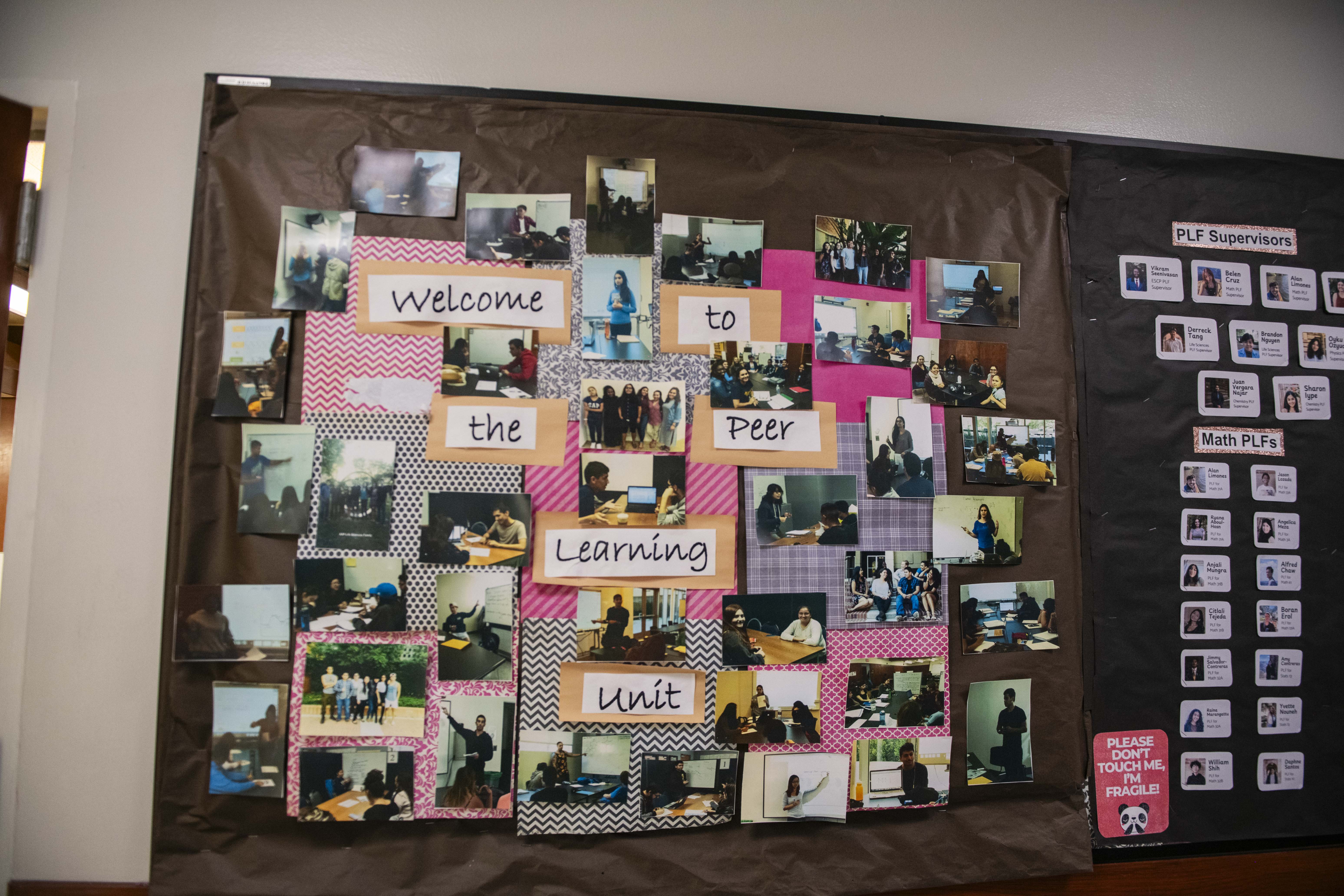Academic Advancement Program to pause some programs, reduce staff amid budget cuts
The front doors to the Academic Advancement Program office is pictured. AAP will undergo program pauses and staffing reductions July 1 because of budget cuts to UCLA’s Division of Undergraduate Education. (Ruby Galbraith/Daily Bruin)
By Amanda Velasco
June 5, 2025 7:31 p.m.
This post was updated June 9 at 4:48 p.m.
Mariah Strawder, a first-generation student, said she felt the weight of setting a good example for her younger brothers after her mother died.
Because her mother died as Strawder began high school, she said she did not have as much time to pursue extracurricular activities while attending Westchester Enriched Sciences Magnets, a Los Angeles Unified School District high school, instead needing to focus on her academics.
But the Vice Provost Pre-College Scholars program, a retention program under UCLA’s Academic Advancement Program, pushed Strawder to take on more leadership positions, she said. Strawder added she later became president of her high school’s Black Student Union and captain of the Academic Decathlon team, for which she said she earned multiple medals in speech and interviewing.
“I got in a really bad place mentally,” she said. “But going through VIPs taught me the importance of sticking through things and also emphasizing the pursuit of higher education.”
Strawder is set to attend UCLA as an incoming first-year public affairs student. However, the life-changing guidance she received might not be given to other students.
AAP, which is overseen by the Division of Undergraduate Education, provides over 6,300 low-income and first-generation college and high school students from historically underrepresented backgrounds with academic advising and peer learning opportunities, said Charles Alexander, director of AAP and associate vice provost for student diversity.
[Related: ‘The program saved my life’: UCLA to eliminate Community Youth Programs]
VIPS is just one initiative under AAP that will pause and lay off staff July 1 because of budget cuts to DUE, AAP announced in a May 20 email. The university is facing “significant budget cuts,” it also said in the email.

UCLA Media Relations did not respond in time to a request for comment on the budget cuts or how the university will support students affected.
As of May 28, VIPS can only be sustained for one more summer session and will pause after the summer of 2025 if AAP does not find more funding, Alexander said. He added that AAP is seeking external funding sources from donors and through fundraising efforts to sustain its units.
The AAP will also pause the Graduate and Professional Service unit and the Research, Assessment and Evaluation unit and undergo staffing reductions. GPS provides undergraduate students and alumni with research opportunities and postgraduate support, while RAE offers students institutional research opportunities to support AAP’s initiatives, according to the AAP website.

Student staff positions across AAP’s Peer Learning unit will also be reduced. The program offers group-facilitated peer learning sessions for lower and upper division courses, as well as the program’s counseling and administration units.
The AAP Computer Lounge – which provides printing services and access to computers and Wi-Fi – will close because of the budget cuts.
In addition, the Freshmen Transfer Summer Program – which offers summer classes and peer counseling to students – will undergo staffing layoffs and a reduction in course offerings, it added in the email.
Alexander said the changes were made in anticipation of budget cuts from the state and federal governments. He added that running AAP costs the university about $2 million.
[Related: Gov. Gavin Newsom’s May Revision reduces proposed budget cuts to the UC]
“We’re talking about the entire system going through what I call a financial crisis,” he said. “A lot of it is driven by what’s going on in our country as far as higher education – how it’s being perceived, how it’s funded.”
However, Alexander said AAP had already been in a budget deficit for around five years due to a lack of revenue to accommodate the rising number of students joining the program. He added that other units under DUE – including the Undergraduate Research Center and the Center for Scholarships and Scholar Enrichment – will also be impacted by the “budget crisis.”
VIPS, which was created in 2005 to address the low application and enrollment rates of Black people at UCLA, offers accepted scholars three residential summer sessions at UCLA. It also offers mentorship through “Saturday academies” – programs where high school students are given guidance from UCLA students and mentors on how to approach college applications and various aspects of the admissions process.
Through VIPS, Strawder said she took a five-week UCLA class on critical issues in education and wrote an eight-page research paper. The class made Strawder realize that her personal experiences can inform societal change, she added.
“The education class … empowered me even more to pursue what I want to pursue and help others,” she said.
Strawder added that VIPS offers workshops that guide guardians on navigating their financial situations and supporting their children’s mental health.
After the program’s first summer component, she said her cohort founded the WESM VIPS Club to share information on college admissions that they learned from VIPS and guide other students with the VIPS scholar application.
But now, Alexander said he is unsure if the initiative will continue past this summer. Former scholars started a petition to save VIPS on change.org and accumulated over 700 signatures supporting the call to action.
“Without VIPS, the journey to college for many students will become vastly more difficult, if not impossible,” the petition said.

Alexander said the Peer Learning unit is central to the program’s mission to provide academic counseling.
Denisse Guevara-Carrillo, a fourth-year cognitive science student, said AAP’s community of students with similar backgrounds provided her a sense of home and helped her navigate culture shock when she arrived at UCLA.
“A lot of students, especially when they’re first generation, they see these challenges, and because they’ve never been exposed to them, they just think that they’re not smart enough to be here or they don’t deserve to be here,” Guevara-Carrillo said. “AAP is able to help you get rid of that imposter syndrome.”
She said she attended peer learning sessions during every quarter of her first two years at UCLA, adding that she would not have performed as well in her lower-division calculus classes – such as Mathematics 31A: “Differential and Integral Calculus” and Mathematics 31B: “Integration and Infinite Series” – without the personalized worksheets and practice problems the program provided.
Guevara-Carrillo said her high school did not offer calculus classes and the peer learning session sizes of about three to 12 students made learning collaborative.
“I feel more comfortable in PLFs because when I go to office hours, … I feel like there’s a lot of students struggling, so there’s a lot of students going into a small office,” she said. “Sometimes, you don’t get the personalized help you would get in a PLF.”
Alexander said peer learning sessions course options will now be reduced because of what he said was limited student demand for certain courses. He added that he believes this might mean upper division classes may not be prioritized in comparison to general education and lower division classes.
Guevara-Carrillo, a former peer counselor in F/TSP, also said the program helps students from low-income backgrounds adjust to college life without worrying about their finances. Some students in F/TSP receive scholarships that either partially or fully fund their tuition, she added.
However, Guevara-Carrillo said she is worried that students who come from disadvantaged backgrounds may no longer have access to the resources and opportunities that AAP offered because of the budget cuts.
“Nobody before them went to college to tell them, ‘This is what you need to do. This is who you need to reach out to. This is how you navigate the system,’” Alexander said. “It’s important that we have those pieces in place.”
